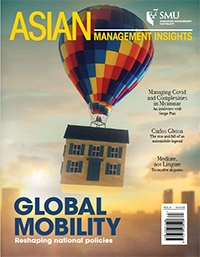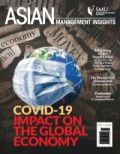
Latest | Volume 08 Issue 2
Global Mobility Reshaping National Policies
Published on
Many countries, enabled by the rapid vaccine rollout, experienced some moments of relief from the Covid-19 pandemic as they embarked on their long and winding transition toward normalcy.
Featured Articles
-
More than half of humanity currently lives in urban areas, and the United Nations predicts that figure will reach 70 percent by 2050.
-
JUMBO Group shows how digital transformation and its seafood business can go together.

Many countries, enabled by the rapid vaccine rollout, experienced some moments of relief from the Covid-19 pandemic as they embarked on their long and winding transition toward normalcy.

Implications for a nation's human resources and technology policies.

The course of their growth and extension never did run smooth.

Finding the right E-Commerce Intelligence solution for your firm.
2020 had been an extraordinary year as the Covid-19 pandemic struck almost all countries in the world and created an extraordinary impact on businesses worldwide. Singapore and many other Southeast Asian countries were not spared and had to implement lockdowns swiftly. To cope with physical store closures and the increased volume of online transactions, most businesses tried to revamp their business models and set up online stores to capitalise on the rise of the e-commerce wave.

Promoting cashless payments at Singapore’s hawker centres.

Was it politics, greed, or hubris that led to Carlos Ghosn’s downfall?

A leader’s first resort.
A Singapore-based food company sees its products listed at a price lower than the agreed rate on an e-commerce site. The listing was posted by a company that is partly owned by the Singapore company’s distributor for Thailand. The Singapore company threatens to terminate its supply to the distributor if the price is not adjusted within two days. The distributor refuses and claims the website is owned by its client, so it has no control over the listed pricing.
If you were one of the parties above, how would you resolve the dispute?

At the forefront of growth in the luxury goods market.

Pair a technical expert with a generalist for successful change management.
Organisations globally are experiencing an accelerated pace of change, driven by a combination of digital disruption and future-of-work pressure, and further intensified by the dynamics associated with the drawn-out Covid-19 pandemic. The situation is leading to the fast-tracking of digital transformation efforts, the formation of new sets of rules and structures for the future-of-work reality, and perhaps even new business models.

An interview with Binny Bansal, co-founder of Flipkart.